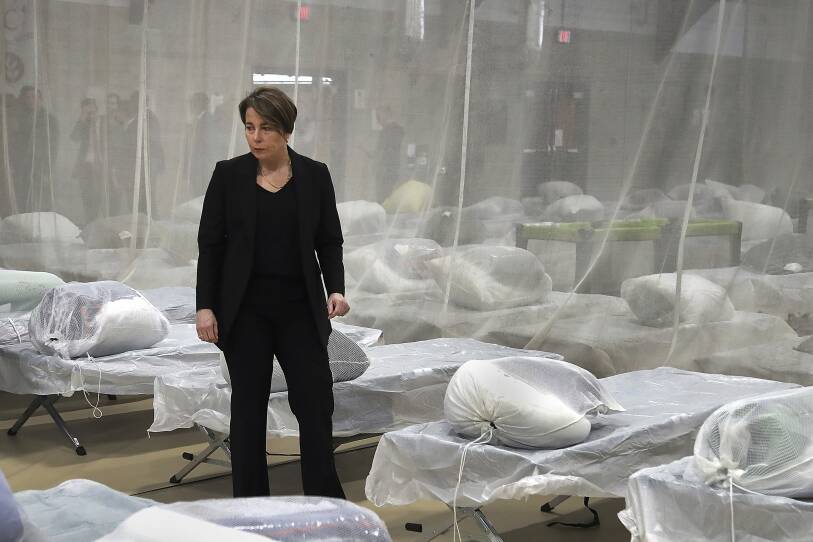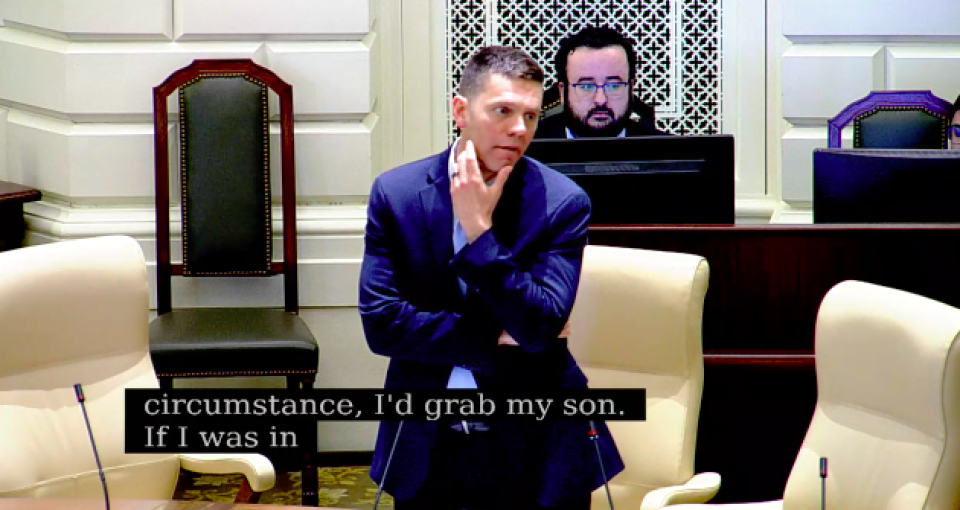A Senate bill that opens the door to the Healey administration using hundreds of millions of dollars for the strained emergency shelter system passed easily during a nighttime vote.
The spending bill passed 32-8, and would allow over $825 million in a state escrow account to be released. It would also cap shelter stays for the majority of families at nine months, although pregnant women and recent mothers could stay longer in the system, and get multiple extensions of 90 days.
Sen. Michael Rodrigues, a Westport Democrat and the Senate's chief budget writer, said the bill is "an appropriate balance" to help families living in the shelters and the communities they reside in.
“About half the families in our shelter system currently are Massachusetts residents. If the money were to run out with any action on a plan,” he said, “we would be talking about thousands of these families suddenly on the street in many communities across the state. This is an unacceptable and equally irresponsible outcome.”
Rodrigues and Senate President Karen Spilka released a joint statement, saying: "The bill requires each family in shelter to receive an individualized rehousing plan; eligibility for shelter after nine months would be contingent upon compliance with the rehousing plan."
The legislation also would set aside $10 million in new spending for workforce support and intervention services, including English language learning and job training.
“If the money were to run out with any action on a plan, we would be talking about thousands of these families suddenly on the street.”Sen. Michael Rodrigues
The Senate action follows a similar bill passed by the House. The House and Senate will need to work out any differences in their bills before sending a final bill to Gov. Maura Healey.
Rodrigues said before the migrant crisis began, Massachusetts lawmakers accounted for a shelter capacity of about 4,100 families, with a monthly cost of $27 million. That has since ballooned, with the state spending $75 million a month on over 7,500 families, which comes out to around $10,000 per family.
The state is required to house homeless families under the 1980s era Right to Shelter Law. The current average length of stay is 16 months, according to the state, which doesn’t differentiate between migrant families and those who are residents of Massachusetts.
It is no secret that the shelter system has been strained for many months, leaving hundreds of families on a waitlist, and even more sleeping in Logan International Airport. As of Thursday, there are 730 families on the waitlist for emergency shelter, which is maxed out at 7,522 families. About half are migrants.

The majority of senators agreed on their concern about the plight of migrants, many of which are escaping war and increasing gang violence in countries like Haiti.
Sen. Robyn Kennedy, a Democrat from Worcester, said she shared the frustration of others toward the federal government, which she says had “abdicated” its responsibility. She said the state needs resources to help immigrants, who “like our ancestors, who all chose to come here, many of whom fled famine or violence and came here seeking safety and a better life.”
Senate President Spilka, an Ashland Democrat, said the bill, "addresses the state’s fiscal reality while also treating individuals who have migrated to our state with dignity and respect."
“As we continue to navigate through a challenge that has landed on our doorstep because of Congressional inaction," she said, "today we are addressing the immediate need to house families, bolstering our existing efforts to support those who have immigrated here in becoming part of our workforce, and providing a roadmap to manage this effort over time.”
The Senate unanimously approved an amendment that will require a safety check at emergency shelters. This comes a week after a Haitian man was accused of raping a migrant teenager with disabilities at a state-run shelter in Rockland.
The amendment filed by Sen. Michael Moore, a Democrat from Millbury, will task a commission with assessing “safety practices and procedures in emergency shelters” and overflow sites.
The Senate also adopted an amendment from Sen. Becca Rausch, a Needham Democrat, that adds “or recent birth” to the legislation, allowing recent mothers to remain in shelters for one or more 90-day extension, not just those that are pregnant.
Many amendments, most from the Senate minority, were rejected. They included an amendment from Senate Minority Leader Bruce Tarr of Gloucester that would have guaranteed that “no individual convicted or charged with a violent felony” would be able to get emergency shelter benefits.
Others that failed were amendments from Tarr and Sen. Ryan Fattman of Sutton that would have instituted a six-month residency requirement to access the emergency shelter system, and barred anyone that enters Massachusetts solely for "obtaining benefits."

A significant amount of anger was directed at Congress. Sen. John Velis, a Westfield Democrat, said that Congress wants to judge Massachusetts “on the effect, but not the causes.” The cause, he said, is that Congress “isn’t doing anything to solve this crisis. And it’s disgusting.”
The Senate bill allows residents to receive multiple three-month extensions under certain circumstances, including if they’re working toward gaining a work permit, a veteran, or the single parent of a child with a disability. The Senate bill also provides shelter funding beyond the current fiscal year, which ends in June.
The Senate bill provides more money to the shelter system than the House. Lawmakers there approved $245 million to keep the emergency shelter system running, with the catch of limiting the amount of time families can spend in shelters to nine months for single adults or a year for families.
The language of the House bill includes a single three-month extension for people who are employed or in the middle of being trained. Pregnant and disabled people could remain for a full year, employed or not.
Eight Democrats and all Republicans voted against the House bill, with Democrats like Cambridge Rep. Mike Connolly previously telling GBH News that his no vote was because access to housing is the biggest barrier to migrants in the shelter system. “A time limit isn’t the right answer,” he said.
House Ways and Means Chair Aaron Michlewitz, a Boston Democrat, said in early March that the House legislation “creates a system that won’t collapse under its own weight.”
The desire to limit shelter stays to ease the burdened system is not a new one in practice. New York City caps stays for most adult migrants at 30 days, unless they have extenuating circumstances, and people 23 and under can stay for 60 days, a move that has advocates urging repeal.
The Massachusetts emergency shelter system is due to run out of funds in April.
The Senate legislation would let the Healey administration draw $75 million a month out of the escrow fund for the shelter system until the end of the fiscal year in June 2024, then that will go down to $65 million monthly and drop by $10 million every three months until June 30, 2025.





